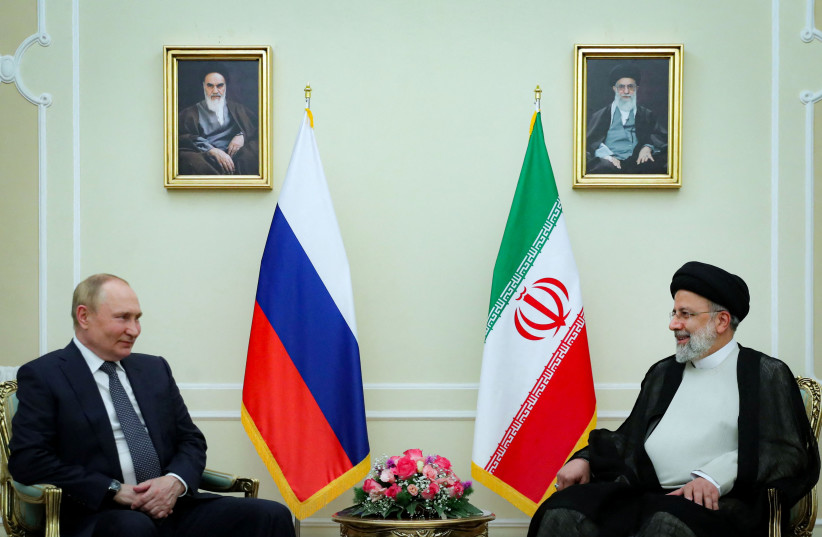In a major move, the European Parliament approved adding Iran’s Islamic Revolutionary Guard Corps (IRGC) to the European blacklist of terrorist groups and tightening sanctions against Iran. The decision does not oblige the European Union to take action against the IRGC. But it comes at a time when foreign ministers are calling for tougher sanctions against Tehran at an upcoming meeting in Brussels.
The parliament’s position paves the way for that decision, which rests solely with the European Council. Putting the IRGC on the European terror list requires a rather complicated legal and political process. Iran’s reaction shows that Europe is very unhappy with the move.
Tehran protested the decision in a telephone conversation between Iranian Foreign Minister Hossein Amir-Abdollahian and EU High Representative Josep Borrel. Abdollahian called the decision “emotional, cruel, unprofessional, and contrary to political civilization” and likened it to “shooting Europe in the foot,” clearly alluding to the consequences for Europe if the decision is officially adopted.
The Iranian reaction so far has been limited to responding to the European Parliament’s decision through the parliamentary channel via the Iranian Shura Council. Action and reaction are not what is striking.
But the toughness demanded by the parties in the European Parliament indicates a possible qualitative change in the European position towards Iran, at least at the parliamentary and popular level.

The position of the European Parliament reflects the growing anger over the positions and policies of the Iranian regime, whether it is Iran’s activities that threaten regional security, whether it is the repression of protesters and the execution of opposition figures, or the supply of drones to Russia in its war against Ukraine – a position that in this case is the straw that breaks the camel’s back.
Reluctancies in categorizing Iran
The European Parliament’s decision is not binding on government officials. But it is an important basis for a tougher European policy toward Tehran, whether on the IRGC issue or on other matters. The parliamentary resolution was adopted by a large majority, with 598 out of 638 MEPs voting in favor of adding the IRGC to the terrorist list.
But it’s not as simple as you might think. The formal adoption of a resolution requires the consensus of all EU member states, achievable given the recent positions. But there remains the question of how to document a legitimate conviction for terrorist acts in member states so that a European court does not subsequently overturn the resolution.
The ball is now in the EU’s court. EU foreign policy chief Josep Borrell did not attend the parliamentary session. He is still talking about the possibility of reviving the nuclear deal, while the majority of MEPs demand that efforts to revive the deal be stopped as a punishment for the Iranian regime.
EUROPEAN CAPITALS are now reportedly palpably fearful of the consequences of a clash or escalation with the Iranian regime, especially as IRGC commanders threaten “unlikely consequences” for European countries and call the demand to put the Guards on the terrorist list a conspiracy.
It is possible that European diplomacy will seize on this issue and use the EU’s position as leverage to get the Iranian regime to return to the plan to revive the nuclear deal, in which Germany, Britain and France were instrumental, and to give up its tough demands, especially regarding the removal of the IRGC’s name from the US terrorist list, a demand that Washington has not yet agreed to.
It is also possible that European diplomacy will take the happy medium of recognizing the inclusion of the Revolutionary Guards on the US terror list as sufficient but at the same time imposing sanctions on specific Revolutionary Guards individuals without generalizing the issue and considering this sufficient to maintain pressure on the Iranian regime if it accepts the conditions for returning to the nuclear deal.
But Iran’s reaction is uncertain. Tehran is accustomed to engaging in brinkmanship diplomacy in such situations whenever possible. It is obvious that the option of closing the door with Iran will not achieve the EU’s goals, especially when it comes to obtaining concessions related to the nuclear deal, which, as the facts confirm, is difficult to revive in the current international situation.
Although the sanctions signed so far by the EU against Iran signal a qualitative shift in the European position, the current climate bodes well for a tougher stance against Tehran, whether vis-à-vis the IRGC or through new, more effective economic sanctions.
Given the international environment created by the war in Ukraine, concerns about an Iranian-Russian alliance threatening European interests and security, and European concerns about the consequences of a tough stance on Iran for its position in the Middle East, particularly in Lebanon, Syria, and elsewhere, it is difficult for Europe to completely rule out the chances of reviving the nuclear deal.
In addition, some European capitals are concerned about IRGC support for new terrorist operations in Europe.
The writer is a UAE political analyst and a former Federal National Council candidate.
